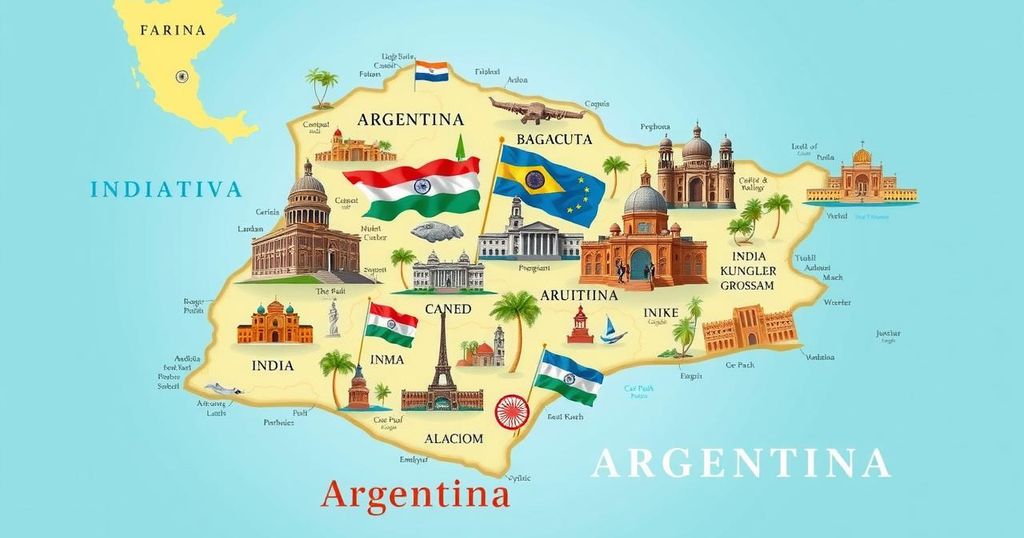Politics
ARAGUA, ASIA, CARACAS, CE, CNN, COUNTER - TERRORISM CONFINEMENT CENTER, CUBA, DEMOCRACY, EL SALVADOR, HUMAN RIGHTS, MAD, MADURO, NAY, NICHOLAS MADURO, NORTH AMERICA, PHILIPPINES, PROTESTS, SOUTH AMERICA, TECOLUCA, TREN DE, TREN DE ARAGUA, TRUMP, UNITED STATES, US, VENEZUELA, VIOLENCE
Jamal Walker
0 Comments
Maduro Condemns U.S. Deportation of Venezuelan Migrants as Kidnapping
Nicolás Maduro has condemned the U.S. deportation of over 200 Venezuelan migrants to El Salvador, calling it a “kidnapping.” He asserts these individuals are not criminals and has pledged to pursue their return with widespread public support. The incident reflects heightened tensions between the U.S. and Venezuela, particularly concerning the treatment of deportees in El Salvador’s notorious prison system.
Nicolás Maduro, the leader of Venezuela, has condemned the deportation of over 200 Venezuelan migrants by the United States to a controversial mega-prison in El Salvador, labeling it a “kidnapping.” Maduro asserted that the deportees are not criminals and criticized El Salvador’s President Nayib Bukele for collaborating with the U.S. in this action, claiming that the migrants did not receive a fair trial or due process before their deportation.
During his address to supporters, Maduro indicated that the Venezuelan government would submit an official request to El Salvador for the return of the deportees. This document would be backed by millions of signatures from Venezuelan citizens advocating for the return of their compatriots.
The recent deportation occurred against the backdrop of U.S. President Donald Trump’s invocation of an 18th-century law to deport individuals he characterized as threats to national security, despite existing legal challenges. Trump described the deported Venezuelans as members of a gang considered a significant threat to public safety.
The deported Venezuelans, alongside several Salvadorans, were sent to the infamous Counter-Terrorism Confinement Center in Tecoluca, El Salvador, which has drawn condemnation from human rights organizations for its treatment of prisoners. Venezuelans have protested in Caracas, asserting that many of those deported are innocent and deserve to return to their families.
Maduro openly supported the protests and the demands for the return of these migrants, celebrating the public outcry. He asserted that the deportees should be freed and returned home, and he mandated increased flights for repatriating Venezuelans from the United States.
The U.S. Immigration and Customs Enforcement (ICE) agency stated that they reviewed the profiles of those deported, asserting ties to criminal gangs, yet they have not released specific identities or accompanying evidence. Some Venezuelans previously deported by the administration have refuted these gang affiliations, citing wrongful suspicions based on personal attributes like tattoos.
In summary, tensions continue to heighten between Venezuela and the United States as Maduro’s government advocates for the return of deported Venezuelans, contending that their rights have been violated in the process. The violence of the issue is underscored by the inhumane treatment alleged in El Salvador’s prison system and the broader implications of U.S. immigration policies.
In conclusion, Nicolás Maduro’s government is vehemently opposing the U.S. deportation of Venezuelan migrants, condemning it as an act of kidnapping. As protests arise in Venezuela for the return of these individuals, Maduro has committed to pursuing their repatriation. This incident underscores the strained relations between Venezuela and the U.S., compounded by serious allegations regarding human rights abuses linked to the deported migrants’ treatment in El Salvador.
Original Source: www.cnn.com




Post Comment